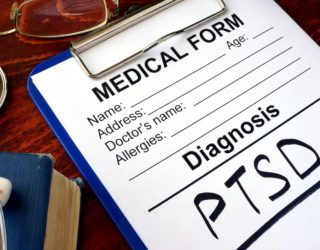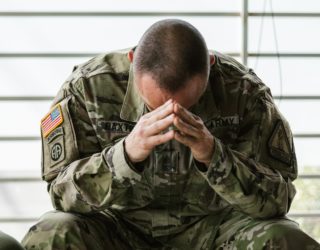More often than not, trauma and addiction go hand in hand. A lot of the people who have experienced horrendous events turn to substances to numb their feelings and continue their lives as nothing happened, despite suffering from PTSD. This type of behavior, however, is self-destructive and can lead to more problems in the long run.
PTSD Veterans


PTSD and Substance Abuse
Finding a Recovery Program for PTSD & Substance Abuse
What Is PTSD
Posttraumatic Stress Disorder (PTSD) is a psychiatric condition that follows the experience of a traumatic event. Some of the most common events that can trigger PTSD include military combat, sexual abuse, rape, domestic violence, and other violent crimes. Natural disasters or terrorist incidents can also lead to posttraumatic stress.
While many trauma survivors return to their daily life without significant issues, the stress symptoms some people experience do not go away that quickly. Moreover, these manifestations may worsen in time and transform into full-fledged PTSD.
A person with this disorder relives the incident or experience through nightmares or flashbacks. They may also feel anxious or detached, suffer estrangement or have difficulty with everyday life or routine activities. The four categories of PTSD symptoms are:
Re-experiencing Symptoms
The person relives the traumatic event. They may have repressed memories of the event that can be triggered by traumatic reminders such as news about similar events, sounds and smells (a backfiring car for a war veteran, sweat or perfume for a rape victim, etc.). If these memories seem too real, the person may believe that the event is happening again, triggering a flashback.
Avoidance Symptoms
Most of the people living with PTSD prefer not to be exposed or close to situations or people likely to remind them of the trauma. They would not go to certain places, watch the news or certain TV shows, avoid people who resemble attackers, etc.
Numbing the Symptoms
Individuals with PTSD cannot maintain a regular flow of social relations. They don’t understand or can’t transmit their feelings. As such, they become isolated, or “numb.”
Wariness Symptoms
The individual is on constant alert and therefore can have difficulty sleeping. They also become extremely irritable and have problems concentrating or completing regular tasks.
How Does Co-Occurring Drug Abuse Set in?
As mentioned above, substance abuse is rather common among people with PTSD as they try to alleviate their symptoms with alcohol, drugs or both. Official reports show that over half of men with PTSD have problems with alcohol, while for women the most common co-occurrence is depressions. Drug abuse is common to both genders and can accentuate the PTSD symptoms and gives patients new health care issues. Here are some of the most common substance abuse and PTSD connections:
- If the person has trouble sleeping because of PTSD, he or she may try to self-medicate with alcohol or drugs. However, these substances do more harm than good, because they worsen sleep quality.
- Use of drugs and alcohol may emphasize the PTSD numbness or wariness symptoms, depending on the drugs used.
- Because they level emotions, drugs and alcohol deepen the cycle of avoidance, which makes it difficult for people with PTSD to overcome their symptoms.
- Drinking and using drugs may be considered a distraction from the symptoms or problems, but they create new problems.
What Are the Health Risks of Substance Abuse?
Apart from the severe chemical reactions induced in the human body by the abused substance, other health issues may appear: HIV/AIDS, hepatitis B or C, cardiovascular diseases or even cancer. The occurrence of infectious diseases among addicts is vast, with 1 in 3 AIDS deaths in the US being related to drugs.
A separate, although crucial, category of conditions are mental illnesses, for which there is a biunivocal relationship: some psychiatric diseases, like anxiety or depression, lead to drug abuse. Substance abuse, at the same time, can worsen the symptoms and create new problems for the patient.
In addition to the harm that addicts do to their own body, their behavior may affect other people as well. For instance, fetal exposure to opioids may induce the withdrawal syndrome in newborns and have lasting consequences on the child’s development.
How Are Co-Occurring Issues Addressed in Treatment?
The fundamental principle that both scientific research and practice have shown is that PTSD and comorbidities must be treated at the same time. Patients need integrated care for mental and substance disorders. The medical staff and counseling teams will work together to develop the best line of treatment.
Complementary to medication, behavioral therapies have also been proved to work. Among these, cognitive-behavioral therapy and exposure therapy are recommended for anxiety disorders (and PTSD falls into that category.)
It may look like you can take matters into your own hands, but until you don’t address the root of the problem, you may not have a chance to a normal life. The first step is always the hardest, but with specialized guidance, you can learn how to come to terms with the traumatic event and manage it without the help of substances.
Helping Veterans with Addiction Recovery
Men and women who have served our country and who have developed an addiction to drugs or alcohol also often suffer from PTSD (Post-Traumatic Stress Disorder). Windward Way has fostered the clinical partnerships to effectively treat PTSD and addiction to drugs or alcohol. Our drug rehab and also our alcohol treatment center can accommodate the PTSD addiction treatment you need—or for a soldier you care about.
Since it’s important that you receive the best care available for men, a post-war trauma treatment at Windward Way can be just the valuable solution you’re looking for. Call the friendly people at Windward Way—they’ll give you the answers you’re after about our addiction treatment program and PTSD. They’re standing by, right now. Call: (855) 491-7694.
A New Life at Windward Way
Windward Way is committed to providing the best care for men and women available. In fact, that’s why we strive to offer an individualized treatment center for PTSD addiction treatment. We’re aware of the many addiction types plaguing veterans with trauma. As it so happens, we’re extremely proud of our program we’ve crafted specifically for these fine people who have served the cause of freedom so bravely.
Call us now to begin the process to reclaim your new life with Windward Way. We want to hear your situation and individualize a plan, just for you. We’re here 24/7 at (855) 491-7694, so call us now!




